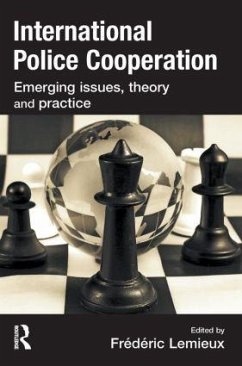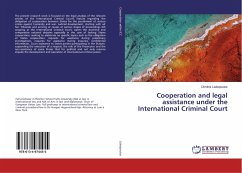International Police Cooperation
Emerging Issues, Theory and Practice
Herausgeber: Lemieux, Frederic
International Police Cooperation
Emerging Issues, Theory and Practice
Herausgeber: Lemieux, Frederic
- Broschiertes Buch
- Merkliste
- Auf die Merkliste
- Bewerten Bewerten
- Teilen
- Produkt teilen
- Produkterinnerung
- Produkterinnerung
This book sets out to analyse the key emerging issues and theory and practice of international police cooperation. Contributors explore emerging initiatives and new challenges in several contexts at both national and international levels.
Andere Kunden interessierten sich auch für
![International Police Cooperation International Police Cooperation]() International Police Cooperation172,99 €
International Police Cooperation172,99 €![Cooperation and legal assistance under the International Criminal Court Cooperation and legal assistance under the International Criminal Court]() Dimitris LiakopoulosCooperation and legal assistance under the International Criminal Court43,99 €
Dimitris LiakopoulosCooperation and legal assistance under the International Criminal Court43,99 €![International cooperation in the search for criminals International cooperation in the search for criminals]() Alexei MaksurovInternational cooperation in the search for criminals24,99 €
Alexei MaksurovInternational cooperation in the search for criminals24,99 €![Inside Police Cooperation Inside Police Cooperation]() Huseyin OrsInside Police Cooperation40,99 €
Huseyin OrsInside Police Cooperation40,99 €![Policing Cooperation Across Borders Policing Cooperation Across Borders]() Saskia HufnagelPolicing Cooperation Across Borders67,99 €
Saskia HufnagelPolicing Cooperation Across Borders67,99 €![Pre-trial cooperation agreement Pre-trial cooperation agreement]() Alexei MaxurovPre-trial cooperation agreement33,99 €
Alexei MaxurovPre-trial cooperation agreement33,99 €![Evolutionary Criminology and Cooperation Evolutionary Criminology and Cooperation]() Evelyn SvingenEvolutionary Criminology and Cooperation83,99 €
Evelyn SvingenEvolutionary Criminology and Cooperation83,99 €-
-
-
This book sets out to analyse the key emerging issues and theory and practice of international police cooperation. Contributors explore emerging initiatives and new challenges in several contexts at both national and international levels.
Produktdetails
- Produktdetails
- Verlag: Willan
- Seitenzahl: 386
- Erscheinungstermin: 1. Januar 2010
- Englisch
- Abmessung: 234mm x 156mm x 21mm
- Gewicht: 585g
- ISBN-13: 9781843927600
- ISBN-10: 1843927608
- Artikelnr.: 28207236
- Herstellerkennzeichnung
- Libri GmbH
- Europaallee 1
- 36244 Bad Hersfeld
- gpsr@libri.de
- Verlag: Willan
- Seitenzahl: 386
- Erscheinungstermin: 1. Januar 2010
- Englisch
- Abmessung: 234mm x 156mm x 21mm
- Gewicht: 585g
- ISBN-13: 9781843927600
- ISBN-10: 1843927608
- Artikelnr.: 28207236
- Herstellerkennzeichnung
- Libri GmbH
- Europaallee 1
- 36244 Bad Hersfeld
- gpsr@libri.de
Frederic Lemieux is Associate Professor of Sociology and Director of the Police Science Programme at George Washington University.
1. The Nature and Structure of International Police Cooperation: An
Introduction 2. Police and Judicial Cooperation in Europe: Bilateral versus
Multilateral Cooperation 3. Towards a Governance Model of Police
Cooperation in Europe: The Twist Between Networks and Bureaucracies 4. A
Market-oriented Explanation of the Expansion of the Role of Europol:
Filling the Demand for Criminal Intelligence Through Entrepreneurial
Initiatives 5. Iterative Development of Co-operation within an Increasingly
Complex Environment: Example of a Swiss Regional Analysis Centre 6. The
Meuse-Rhine Euroregion: A Laboratory for Police and Judicial Cooperation in
the European Union 7. Convergent Models of Police Cooperation in
Anti-organized Crime and Anti-terrorism Activities 8. The France and
Europol Relationship: Explaining Shifts in Cooperative Behaviour 9.
Parallel Paths and Productive Partners: The EU and US on Counter-terrorism
10. Cross-strait Police Cooperation between Taiwan and China 11. Police
Cooperation in the Context of Peacebuilding: Observations from African
Quarters 12. Police-Military Cooperation in Foreign Interventions:
Timor-Leste and the Solomon Islands 13. International Police Organizations:
The Missing Link to Cooperate Effectively 14. Tackling Transnational Drug
Trafficking Effectively: Assessing the Outcomes of the Drug Enforcement
Administration's InternationalCooperation Initiatives 15. Challenges of
Governance and Accountability for Transnational Private Policing 16. The
Constabulary Ethic Reconsidered
Introduction 2. Police and Judicial Cooperation in Europe: Bilateral versus
Multilateral Cooperation 3. Towards a Governance Model of Police
Cooperation in Europe: The Twist Between Networks and Bureaucracies 4. A
Market-oriented Explanation of the Expansion of the Role of Europol:
Filling the Demand for Criminal Intelligence Through Entrepreneurial
Initiatives 5. Iterative Development of Co-operation within an Increasingly
Complex Environment: Example of a Swiss Regional Analysis Centre 6. The
Meuse-Rhine Euroregion: A Laboratory for Police and Judicial Cooperation in
the European Union 7. Convergent Models of Police Cooperation in
Anti-organized Crime and Anti-terrorism Activities 8. The France and
Europol Relationship: Explaining Shifts in Cooperative Behaviour 9.
Parallel Paths and Productive Partners: The EU and US on Counter-terrorism
10. Cross-strait Police Cooperation between Taiwan and China 11. Police
Cooperation in the Context of Peacebuilding: Observations from African
Quarters 12. Police-Military Cooperation in Foreign Interventions:
Timor-Leste and the Solomon Islands 13. International Police Organizations:
The Missing Link to Cooperate Effectively 14. Tackling Transnational Drug
Trafficking Effectively: Assessing the Outcomes of the Drug Enforcement
Administration's InternationalCooperation Initiatives 15. Challenges of
Governance and Accountability for Transnational Private Policing 16. The
Constabulary Ethic Reconsidered
1. The Nature and Structure of International Police Cooperation: An
Introduction 2. Police and Judicial Cooperation in Europe: Bilateral versus
Multilateral Cooperation 3. Towards a Governance Model of Police
Cooperation in Europe: The Twist Between Networks and Bureaucracies 4. A
Market-oriented Explanation of the Expansion of the Role of Europol:
Filling the Demand for Criminal Intelligence Through Entrepreneurial
Initiatives 5. Iterative Development of Co-operation within an Increasingly
Complex Environment: Example of a Swiss Regional Analysis Centre 6. The
Meuse-Rhine Euroregion: A Laboratory for Police and Judicial Cooperation in
the European Union 7. Convergent Models of Police Cooperation in
Anti-organized Crime and Anti-terrorism Activities 8. The France and
Europol Relationship: Explaining Shifts in Cooperative Behaviour 9.
Parallel Paths and Productive Partners: The EU and US on Counter-terrorism
10. Cross-strait Police Cooperation between Taiwan and China 11. Police
Cooperation in the Context of Peacebuilding: Observations from African
Quarters 12. Police-Military Cooperation in Foreign Interventions:
Timor-Leste and the Solomon Islands 13. International Police Organizations:
The Missing Link to Cooperate Effectively 14. Tackling Transnational Drug
Trafficking Effectively: Assessing the Outcomes of the Drug Enforcement
Administration's InternationalCooperation Initiatives 15. Challenges of
Governance and Accountability for Transnational Private Policing 16. The
Constabulary Ethic Reconsidered
Introduction 2. Police and Judicial Cooperation in Europe: Bilateral versus
Multilateral Cooperation 3. Towards a Governance Model of Police
Cooperation in Europe: The Twist Between Networks and Bureaucracies 4. A
Market-oriented Explanation of the Expansion of the Role of Europol:
Filling the Demand for Criminal Intelligence Through Entrepreneurial
Initiatives 5. Iterative Development of Co-operation within an Increasingly
Complex Environment: Example of a Swiss Regional Analysis Centre 6. The
Meuse-Rhine Euroregion: A Laboratory for Police and Judicial Cooperation in
the European Union 7. Convergent Models of Police Cooperation in
Anti-organized Crime and Anti-terrorism Activities 8. The France and
Europol Relationship: Explaining Shifts in Cooperative Behaviour 9.
Parallel Paths and Productive Partners: The EU and US on Counter-terrorism
10. Cross-strait Police Cooperation between Taiwan and China 11. Police
Cooperation in the Context of Peacebuilding: Observations from African
Quarters 12. Police-Military Cooperation in Foreign Interventions:
Timor-Leste and the Solomon Islands 13. International Police Organizations:
The Missing Link to Cooperate Effectively 14. Tackling Transnational Drug
Trafficking Effectively: Assessing the Outcomes of the Drug Enforcement
Administration's InternationalCooperation Initiatives 15. Challenges of
Governance and Accountability for Transnational Private Policing 16. The
Constabulary Ethic Reconsidered









